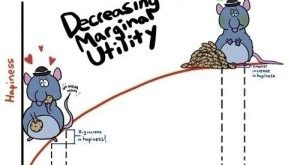Yours truly — ett porträtt Lars Syll har en blogg som läses av många runtom i världen och är även aktiv på Twitter, två anledningar bakom hans placering på listan bland världens mest inflytelserika ekonomer. På bloggen växlar han mellan att skriva på de fem språk han kan, svenska, franska, tyska, italienska och engelska och beskriver sig själv som en renässansmänniska som vill nå ut med flera budskap … — Som akademiker har vi tre uppgifter, att undervisa,...
Read More »Incompetent economists
Teaching economics students the fundamentals of the utility theory used in mainstream economics is a bit of a challenge. But I guess we all expect the professors to know what they are teaching … At a meeting of the American Economic Association (AEA), 200 of the professional economists present were asked to answer the following question: “You won a free ticket to see an Eric Clapton concert (which has no resale value). Bob Dylan is performing on the same night and is your...
Read More »Finanspolitiken och de växande investeringsbehoven
.[embedded content] Ett av de grundläggande feltänken i dagens diskussion om statsskuld och budgetunderskott är att man inte skiljer på skuld och skuld. Även om det på makroplanet av nödvändighet är så att skulder och tillgångar balanserar varandra, så är det inte oväsentligt vem som har tillgångarna och vem som har skulderna. Länge har man varit motvillig att öka de offentliga skulderna eftersom ekonomiska kriser i mångt och mycket fortfarande uppfattas som förorsakade av för...
Read More »Utility theory — explaining everything and nothing
Utility theory — explaining everything and nothing Despite the rise of behavioral economics, many economists still believe that utility maximization is a good explanation of human behavior. Although evidence from experimental economics and elsewhere has rolled back the assumption that human agents are entirely self-interested, and shown that altruism and cooperation are important, a prominent response has been to modify individual preference functions so...
Read More »How economists reshape the world
How economists reshape the world [embedded content] To yours truly, the real value of Appelbaum’s meticulously researched history of how economists have come to increasingly influence public policies in modern societies, is that it shows how fundamentally ideological economics is. Of course, you never hear anyone at our seminars telling the lecturer that the assumptions on which his models are built are only made for ideological reasons. But that does not...
Read More »But once, we were here …
But once, we were here … .[embedded content] One of the greatest movie scenes ever. Both the movie and soundtrack of this magnificent classic are epic. [embedded content] In loving memory of my brother, Peter ‘Uncas’ Pålsson.
Read More »O Magnum Mysterium
Like Arvo Pärt’s music, Ola Gjeilo’s gives a sense of connecting with a world beyond the world. O Magnum Mysterium, with its choral textures shifting between unison singing, polyphony, and homophony, manages to convey the profound serene beauty and mystery of our human existence. Gjeilo’s masterpiece has been recorded dozens of times. This is the greatest of them all: [embedded content]
Read More »Vad ALLA bör veta om statistik
Vad ALLA bör veta om statistik Även om man inte själv har tänkt sig producera statistik, bör alla som ägnar sig åt akademiska studier i någon form ha nog kunskaper för att förstå och värdera statistik på ett korrekt sätt. Fallgroparna är många. Den här boken hjälper med förtjänstfull pedagogisk handledning att få läsaren att undvika dessa.
Read More »Why not all economists like yours truly
Why not all economists like yours truly Yesterday, one of my economics students amused herself by asking a famous AI chatbot “Why not all economists like Lars Syll” and got this — I guess pretty accurate — response … Professor Lars Pålsson Syll is a vocal critic of mainstream economics and advocates for pluralism in economic thinking. Overall, Lars Syll is recognized as a prominent figure in the realm of heterodox economics and critical inquiry into the...
Read More »The problem with model-based explanations in economics
The problem with model-based explanations in economics One of the most important tasks of social sciences is to explain the events, processes, and structures that take place and act in society. Explanations are important within science since the choice between different theories hinges in large part on their explanatory powers. The most reasonable explanation for one theory’s having greater explanatory power than others is that the mechanisms, causal...
Read More » Lars P. Syll
Lars P. Syll





